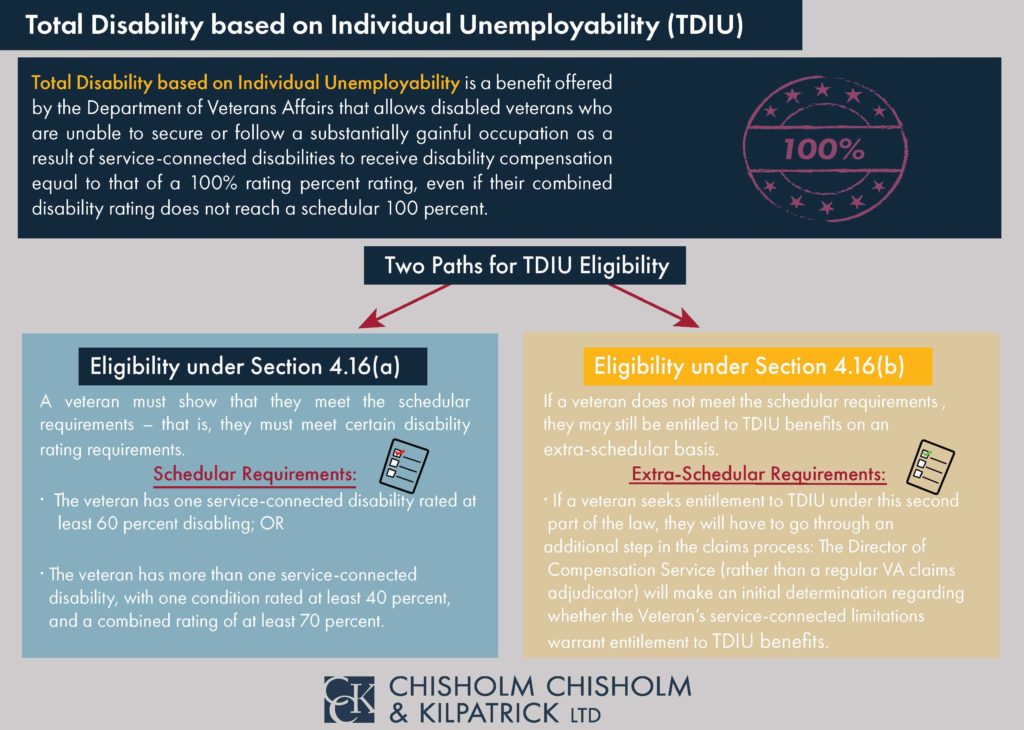How Does VA Rate Migraine Headaches?

CCK Law: Our Vital Role in Veterans Law
Many servicemembers and veterans experience migraines. If you are a veteran who experiences migraines because of your military service, you may be eligible to receive VA disability benefits from VA.
What Are Migraines?
Migraine headaches are a type of headache characterized by debilitating symptoms that can last anywhere from hours to days, depending on the person.
Symptoms of Migraines
- Nausea
- Vomiting
- Sensitivity to light and sound
- Lightheadedness
- Blurred vision
Causes of Migraines
Specifically, there is no one clear reason why a person may experience migraines. However, there are triggers associated with migraines. A trigger can cause a person’s migraine symptoms to flare up.
Some potential triggers include:
- Hormonal imbalance
- Alcohol
- Stress
- Sensory stimulation
- Certain foods
- Changes in environment
How to Get Service Connection for Migraine Headaches
In order to be awarded VA disability benefits for any condition, VA first has to grant the veteran service connection. Veterans can apply for service connection by filling out VA Form 21-526 EZ.
In addition to the filled-out form, veterans will need to submit evidence that they experience migraines and that their migraines are related to their military service. Specifically, veterans should submit:
- A current diagnosis of migraines; AND
- Evidence of an in-service event or stressor which caused or aggravated the veteran’s migraines; AND
- A nexus which links the veteran’s migraines to their service
A good example of evidence that may be used to prove a veteran’s in-service event or stressor is lay evidence. Lay evidence can be written by the veteran, a close friend or family member, or a fellow servicemember. For example, a veteran may experience migraines as side effect of a blow to the head, or traumatic brain injury, they suffered during their military service. With lay evidence, the veteran could explain how their brain injury contributes to their headaches and detail their account of the injury.
Another example of how lay evidence may be used to support a claim for migraines is if the veteran’s spouse notices that the veteran experiences debilitating migraines at least five times per month that often prevent the veteran from leaving the house. In this case, the spouse can write a lay statement describing how the veteran’s migraines affect them.

How to Get Secondary Service Connection for Migraines
Veterans can also receive benefits for migraines through secondary service connection, such as if they developed migraines secondary to a traumatic brain injury. Migraines can be secondary service connected to another condition, or have a condition be secondary service connected to the migraines.
If a veteran is seeking secondary service connection for migraines, they will need to submit:
- A current diagnosis of migraines
- Medical evidence showing the relationship between the primary condition and migraines
Essentially, with secondary service connection, the veteran does not need to provide evidence of an in-service event or stressor, but rather only needs to provide evidence that the secondary condition is linked to the primary one.
Compensation & Pension Exams for Migraines
When attempting to obtain service connection for migraine headaches, VA will likely schedule you for a Compensation and Pension exam. Compensation & Pension exams are performed by either a VA examiner or a VA-contracted examiner. This examiner will use the exam to gather information about your condition in order to render an opinion as to whether it is at least as likely as not your current diagnosis is related to your service.
When you attend your exam, be sure to thoroughly explain the severity of your symptoms to the examiner. For C&P exams for migraines, the examiner will evaluate whether your migraines are prostrating, so it is important to detail any symptoms or limitations you experience during a migraine episode to ensure the examiner can accurately assess your condition.
It is extremely important to attend any exams that VA requests. If you fail to attend an exam, or fail to follow up with scheduling an exam, VA could deny your claim.
If you receive an unfavorable opinion after your exam, there are ways to challenge it. Obtain a copy of your VA exam to see if any information discussed during the appointment is missing or noted inaccurately. If the VA examiner concludes there is no connection between your condition and your military service, a second opinion from your treating physician may provide the positive nexus needed. As mentioned previously, it can also be helpful to submit lay statements because you are able to attest to the severity of your symptoms and how they affect you on a daily basis.
How Does VA Rate Migraines?
VA rates migraine headaches under 38 CFR § 4.124a, Schedule of Ratings – Neurological Conditions and Convulsive Disorders, Diagnostic Code 8100. This diagnostic code has ratings ranging from 0 to 50 percent, with criteria based on severity and frequency of the migraines. The rating assigned will correspond to the amount of VA disability compensation a veteran will receive. Below are the criteria for each rating:
- 50% – with very frequent completely prostrating and prolonged attacks productive of severe economic inadaptability
- 30% – with characteristic prostrating attacks occurring on an average of once a month over the last several months
- 10% – with characteristic prostrating attacks averaging one in two months over the last several months
- 0% – with less frequent attacks
Important: What Is a “Prostrating” Migraine?
The term “prostrating” generally means that the veteran’s migraine headaches are so severe and debilitating that they are required to lay down for an extended period of time due to complete exhaustion and physical weakness. Typically, prostrating migraines also require veterans to stop all activity and possibly take medication or seek medical attention.
How Can I Show That My Migraine Headaches are Prostrating?
There are a number of ways veterans can show VA that their migraines are prostrating.
- Submit lay statements. Lay statements can be useful as they give veterans a chance to detail their symptoms and the impact they have on their daily life or ability to work. In your lay statements, it may be helpful to explain what happens when you get a migraine and what activities you are not able to do when you experience one.
- Submit a medical opinion. Medical opinions can be provided by your personal physician and can be used to provide evidence of prostration. Your doctor can attest to the severity of your migraines and whether they can be considered prostrating. Speak to your doctor to see if they would be willing to write a letter in support of your claim.
Can I Receive TDIU For My Migraines?
If a service-connected migraine headache condition contributes to preventing a veteran from obtaining and maintaining substantially gainful employment, they may be eligible for total disability based on individual unemployability (TDIU).
TDIU is a monthly VA benefit that compensates veterans at the 100 percent level if they are prevented from working because of their conditions.
VA requires that veterans fill out Veteran’s Application for Increased Compensation Based on Unemployability for all TDIU claims.
In order to be eligible for Schedular TDIU, veterans must have one condition rated at 60 percent minimum OR two conditions that can be combined to reach 70 percent, where one condition is at minimum 40 percent. As such, secondary service connection can be extremely helpful in boosting veterans to the 70 percent minimum needed for multiple conditions to achieve TDIU. The criteria for schedular TDIU is outlined under 38 CFR § 4.16a.
Importantly, if your migraines are secondarily service connected to another condition, both ratings for your migraines and your primary service-connected condition can contribute toward your schedular TDIU eligibility.
Veterans who do not meet the necessary criteria for schedular TDIU may still be eligible for extraschedular TDIU. For this form of TDIU, veterans must prove that their condition(s) uniquely hinder their ability to maintain substantially gainful employment. Extraschedular TDIU is rated under 38 CFR § 4.16b.

Getting Help Fighting for Your Migraine Benefits
If you have been denied VA benefits for migraines, do not give up hope. The accredited veterans’ advocates at Chisholm Chisholm & Kilpatrick have helped countless veterans with their VA disability benefits for migraines in the past and may be able to do the same for you. Our experienced team can build a strong case based on the evidence and craft a persuasive appeal to help fight for you. Call us today for a free case evaluation.
About the Author
Share this Post
